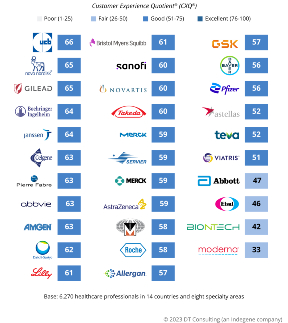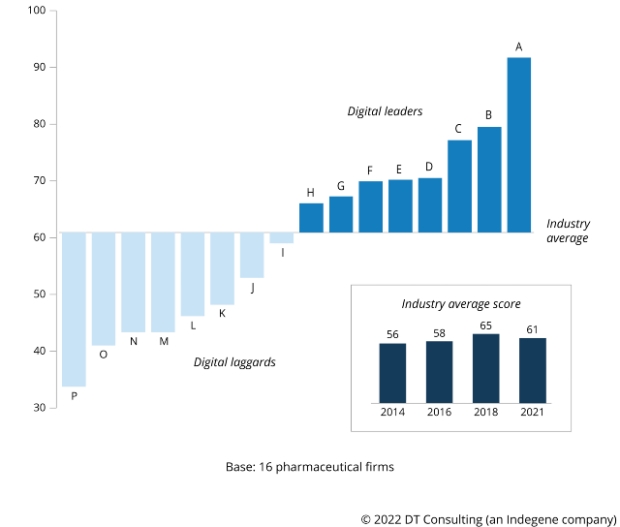Frontiers Health took centre-stage in Berlin last week and pharmaphorum was once again on hand for live coverage of the digital health innovation conference.
The event saw an impressive cast of pharma companies, digital health start-ups, health tech investors and others from the ecosystem assemble at the stunning Frank Gehry-designed Axica congress centre.
After a hectic three days of live blogging and tweeting from the media table, thoughtfully provided for those of us typing all day, here are 5 takeaways from Frontiers Health 2019.
#1: There’s never been a better time to be in digital health
First up, now is a good time for start-ups seeking digital health funding. One of those providing insights into the market at Frontiers Health was digital health advisor Marc Sluijs, who’s been tracking digital health deals for some eight years.
He noted that more and more profitable companies can now be seen, adding:
We’re now finally reaching a point where we see more companies reaching a meaningful scale and bring their solutions to more patients worldwide.
This point was echoed by Polina Hanin, academy director at Startup Health, who declared there has never been a better time to be a health entrepreneur.
But she cautioned that entrepreneurs can have a tough time breaking through with their ideas, with a lack of clarity around messaging or immature metrics for investors being two of the things that are holding back some start-ups.
One more perspective was provided by Brent Stackhouse. He’s managing director of Mount Sinai Ventures, which is the US healthcare institution’s venture arm and operates in a similar way to traditional healthcare investors.
Hospital institutions are inherently risk-averse, venture investment is inherently risky – we sit at the nexus of those two, said Brent. From this vantage point he noted that the deal count is projected to reach an all-time high in 2019, adding that his own portfolio has doubled in size over the last two years.
#2: There’s a wealth of digital health start-ups out there
You can’t talk about Frontiers Health and not mention the digital health start-ups that appear there.
From presentations by some of Bayer’s 2019 G4A programme intake to pitches from start-ups competing in Almirall’s newer Digital Garden initiative and many more besides, there were plenty of health tech entrepreneurs taking to the event’s stages to talk about their work.
They included chronic pain-focused digital health start-up Upside Health. Like a number of the other companies presenting – and, indeed, digital health start-ups in general – the condition Upside targets is one its founder has personal experience of.
In Rachel Trobman’s case, this led to the development of the ouchie app, which has been used by more than 10,000 patients in its first year on the market and combines congnitive behavioural therapy, community support, pain tracking and education resources.
Chronic conditions more broadly are the focus of another digital health start-up that was there – India’s Wellthy. Its CEO Abhishek Shah explained how the firm has a clinically-validated behavioural intervention platform to help people change their behaviours and reduce their risk of chronic disease. Wellthy went commercially-live this year and is working with hospitals, med device companies, pharma firms and others.
Meanwhile, one of the many start-ups pursuing an interesting approach was Okko Health, which wants to expand access to eye care.
Its strategy for doing this involves a game that measures users’ vision to collect how they see, in terms of contrast and how objects line up. In doing this it can detect changes in eye condition and direct users to see a doctor if needed. Its plan is to be able to detect eye disorders ahead of time through a big data approach.
#3: Germany’s new digital health law is one to watch
Germany’s new digital health law understandably captured quite a bit of airtime at Frontiers Health 2019.
Just 17 years in the making, as Mimi Hearing Technologies’ Henrik Matthies quipped, the act lowers the threshold for new digital health companies to enter the market, providing a 12-month grace period for some before clinical trials are needed.
Henrik, who also serves as managing director of the German ministry of health’s Health Innovation Hub, explained:
We finally have something as an easy step into the healthcare system for healthcare innovations.
Konstantin Mehl, the founder and CEO of digital therapeutics firm Kaia Health, said the recent legal changes in Germany were indeed a positive signal for the industry, adding that at the moment most good European digital health start-ups feel like they have to go to the US to be successful. Perhaps the changes in Germany will help to buck that trend.
#4: Healthcare business models are changing
“Tech is entering healthcare in a big way. Companies like Google, Microsoft and Amazon are liked by their customers – how many in healthcare can say that?” questioned Jeff Dachis, founder and CEO of diabetes-focused digital health company One Drop.
He came to the stage to talk about how healthcare business models are changing, noting that at present pharma’s internal R&D returns are below the rates of capital. We lose more money investing in R&D than we make, he said.
Jeff gave the Frontiers Health audience a whistle-stop tour of the massive computing power harnessed within mobile technology, the massive amounts of data this creates and how APIs can tap into this.
From there he naturally lead onto artificial intelligence in healthcare and the availability of large, structured data sets, but stressed that among all this technology “the patient experience becomes key to defining value within healthcare”.
The impact of these changes is the rise of new business models, including new platforms, cash-pay/direct-to-consumer structures, at-risk contracting and even healthcare as a loss-leader for other parts of the business.
“Healthcare for diabetes today is retrospective,” Jeff said. “It’s a ‘sick care’ system treating the actions of things I already did. Healthcare should be like having a car with advanced collision impact systems.”
#5: Digital is part of the pharma mainstream … but there’s more work to do
A complementary perspective to Jeff’s was provided by pharmaphorum founder and CEO Paul Tunnah, who said that, actually, “tech needs pharma as much as pharma needs tech”, which makes sense when you think about everything pharma can do that tech firms can’t.
Paul moderated a panel discussion of digital transformation in the pharmaceutical industry with Erik Sundermann from Sanofi, Andre Heeg from Sandoz, Orientina Di Giovanni from Z-Cube, Sammeli Liikkanen from Orion and Francesca Wuttke from Allmiral.
Orientina from Italian pharma company Zambon’s corporate venture arm Z-Cube, was keen to see digital technology improve the continuity of care for patients, and one of her company’s initiatives saw it run an accelerator for start-ups working on solutions for Parkinson’s care.
Oncology was highlighted as another therapy area where digital health has a lot of potential to improve care. As Sammeli explained, there are huge gaps in emotional support for patients and a need for information in layman’s terms for them:
Digital health is a kind of Eldorado, we just haven’t found the gold yet.
Concluding that panel with a look back at the changes he’s seen in pharma’s last two decades, Erik Sundermann, who’s global project head for the Verily portfolio in diabetes development at Sanofi, said that digital was now firmly part of the pharma mainstream.
Twenty years ago innovation was just about getting FDA/EMA approval, he said, and then it was that plus getting market access approvals, and now it’s those two and also gaining connections with the digital environment.
• Read pharmaphorum’s full coverage from Frontiers Health 2019











